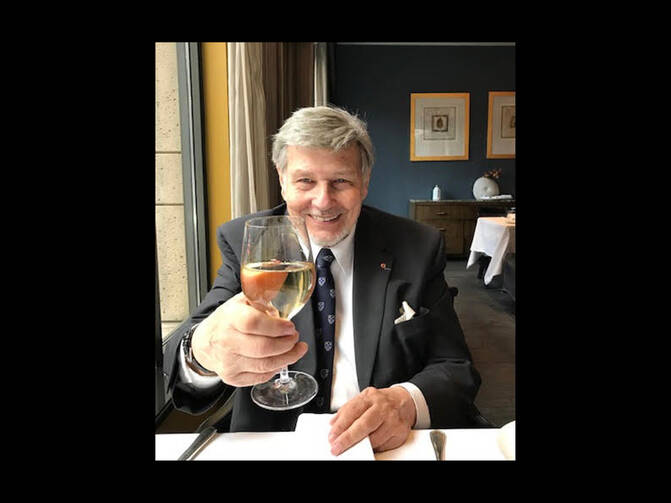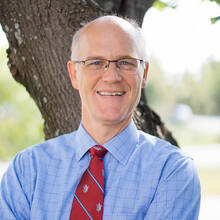Canada has lost a remarkable scholar, public figure and Jesuit priest. Jacques Monet, S.J., passed away peacefully on May 14 at the age of 94, leaving behind a great legacy to his church and nation. Fluent in both of his country’s official languages, Monet was a prolific historian of Canada and the Society of Jesus. A confidant to Canada’s governors general and other notables, he endeared himself to people of all walks of life, including his brother Jesuits, with characteristic charm, erudition and thoughtfulness.
Born in Saint-Jean-sur-Richelieu, Québec, on Jan. 26, 1930, Monet grew up in a bilingual family steeped in the cultural and political history of Canada. His love for the monarchy was already evident when, as a young boy, he witnessed from the balcony of his father’s law office the royal visit of King George VI and Queen Elizabeth to Montreal in 1939.
Inspired by the Jesuits he met at Loyola College, Montreal, he put aside his childhood dream of becoming a radio actor to enter the Jesuit novitiate at Guelph in 1949. Jesuit life became “the most exciting vocation I can think of,” as he later recalled, without experiencing “one dull moment.” After studies in the humanities and philosophy, Monet taught for two years at St. Mary’s University High School in Halifax, where his love for history led him to doctoral work at the University of Toronto. His thesis on 19th-century French-Canadian nationalism, published in 1969 as The Last Cannon Shot, reflected his argument that the monarchy defended freedom and minority rights.
Monet’s work also established him as a leading scholar in a field that had become a national concern. As Canada marked its centenary, national pride—as seen at the World’s Fair at Montreal’s Expo 67 —gave way to a national unity crisis. In French Canada, the Quiet Revolution was in full swing, President Charles de Gaulle of France had proclaimed “Vive le Québec libre!” to cheering throngs in Montreal, and Québec nationalism was on the rise.
After his ordination in Montreal and tertianship in Wales, Monet taught history at the University of Ottawa, where he remained until 1982. During this period, he befriended academics and political leaders in the nation’s capital, becoming a close advisor to Jules Léger, Canada’s then-governor general. As chair of the university’s history department, he became well-known nationally, assuming leadership in the Canadian Historical Association, the Social Sciences Federation and the Royal Society of Canada.
Monet taught and published widely on Canadian history, especially on the role of the monarchy, making him “one of the foremost experts on the Crown in Canada,” according to The Toronto Globe and Mail. His scholarly work earned him the Queen’s Jubilee Gold Medal, the Governor General’s Gold Medal and the Centenary Medal of the Royal Society of Canada. Educators, policymakers and media across Canada sought his insights into political and church history. In 2012, Prime Minister Stephen Harper appointed Monet to the Advisory Committee on Vice-Regal Appointments, a nonpartisan body of eminent persons to determine the choice of governors general and lieutenant governors. Monet was a frequent commentator on national radio and television networks, in both English and French, especially for royal and papal visits, thus, in a way, fulfilling his childhood dream.
Monet returned to Toronto in 1982 to Regis College, where he served as president for six years and taught history for over a decade. He also founded the Canadian Institute of Jesuit Studies, where he published on Jesuit history and taught generations of Jesuits in formation about the “family history” of their order. He wrote scholarly articles in English and French, contributing to the Dictionary of Canadian Biography, Encyclopedia Britannica and, later, the Cambridge Encyclopedia of the Jesuits.
A born raconteur, his anecdotes and bons mots endeared him to many, whether he told the long or the short version. From 1992 to 1999, Monet served as president of the University of Sudbury, an experience he remembered fondly as “a microcosm of Canada” for its bilingual and tri-cultural mandate—with a program in Indigenous studies, one of the first in Canada. During this time, the government of France made him a chevalier of the Ordre des Palmes Académiques for his contributions to the Francophone community.
For the rest of his active life, Monet was director of the Jesuit province archives, first in Toronto and then in Montreal, making regular trips between the two cities. His crowning achievement took the form of two major scholarly works: a three-volume Dictionary of Jesuit Biography and a three-volume history of the Jesuits in English Canada. A sudden collapse in early 2019 brought him to the Jesuit infirmary where, amid declining health and failing memory, he nonetheless kept his gracious charm, warm smile and signature red sweater.
Inspired by his patron St. James and the Canadian martyrs, Monet lived out his priesthood through friendship, often over a fine meal with loved ones. On such occasions, he evoked a phrase from St. Isaac Jogues: “Quelques amis bien choisis” (“a few well-chosen friends”). His friendship was found in kind gestures: thoughtful notes of congratulations or condolences, always in beautiful penmanship in red ink with a fountain pen, never a ballpoint; regular annual visits to friends near and far; weddings and baptisms for former students.
He memorialized special evenings with friends by having them sign the wine bottle, a collection that grew in size over the years until a superior sought to get rid of them. Ever the obedient Jesuit, Monet meticulously removed each label to save and cherish his friends’ signatures.
His many expressions of support, encouragement and friendship were never forgotten by those fortunate to receive them. A gentleman par excellence, Jacques Monet always remembered those dear to him with cards, flowers and prosecco. And they remember him with affection and gratitude.








